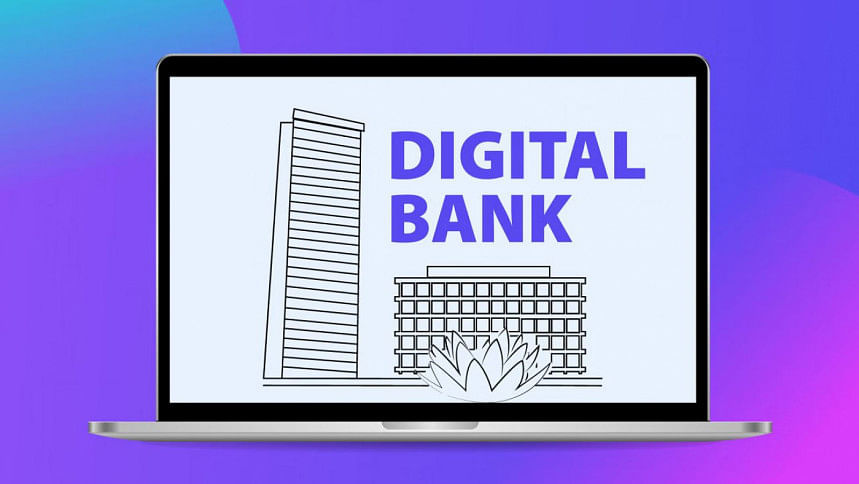Should existing banks get digital bank licence?

Bangladesh Bank received 52 applications for the digital bank licence, with the majority of the forms coming in from the existing 62 banks -- when their current licence allows them to offer the same service already.
Around 500 companies including banks, non-bank financial institutions, mobile financial service (MFS) providers, mobile operators, IT firms, start-ups, pharmaceuticals and cement manufacturers applied for the digital bank licence, The Daily Star has learnt from central bank officials with knowledge of the matter.
Digital banks are online-only banks that offer customers a range of financial services through digital channels, such as mobile apps and websites -- and without any traditional physical branch networks. Globally, digital banks are set up by fintech start-ups who have the technical know-how to offer the services at scale at a low cost.
In its guideline, BB said digital banks will not be allowed to issue any physical instrument, give out loans to carry out foreign trade and disburse term loans to medium and large industries.
"52 applications were received, which is more than our expectation," BB Spokesman Md Mezbaul Haque told The Daily Star yesterday.
The deadline for applying for the digital bank licence ended on August 17, after it was extended by 16 days.
The applications will now be scrutinised and those that meet the BB's 'fit and proper' criteria will be forwarded to the board for approval, he said.
BB will initially issue a letter of intent for the licence, said Haque, who is also an executive director of the central bank.
He, however, did not disclose the number of digital bank licences that would be issued.
One of the applications is from a consortium of 10 private banks called Digi10 Bank.
The ten banks are City, Eastern, Mutual Trust, Mercantile, NCC, Midland, Dutch-Bangla, Prime, Trust and Pubali.
Dutch-Bangla and Trust have MFS operations called Rocket and TAP respectively.
Another application is from a consortium of four state-owned commercial banks: Sonali, Agrani, Janata, and Rupali.
United Commercial Bank, which has an MFS arm called UPay, is leading another consortium that includes Genex Infosys, Navana Pharmaceuticals and Aramit for the UPAY Digital Bank.
Most of the private sector banks are owned by large business groups and they are serving large clients, said AKM Fahim Mashroor, chairman of BASIS standing committee on fintech and digital payment.
"Very few serve small entrepreneurs. If big corporations and business groups own digital banks too, it is highly doubtful that anything will change," he added.
"Traditional banks would not be able to do good in digital banking -- they need to team up with a tech-based or fintech company," said Ahsan H Mansur, a former chairman of Brac Bank.
Brac Bank is investing in the proposed digital bank of its trailblazing MFS subsidiary bKash, which also counts the World Bank Group's International Finance Corporation, Bill and Melinda Gates Foundation, Ant Group, Money in Motion LLC and SoftBank Vision Fund in its board.
"Our shareholders have a long and proven experience of working on financial inclusion as well as world-class digital banks. Their global experience along with 12 years of involvement in Bangladesh's financial inclusion through digital services has made us interested in a digital bank," Kamal Quadir, chief executive officer of bKash, told The Daily Star yesterday.
Along with the pilot, bKash has been practising Bangladesh's first-ever digital loan for the last three and half years under BB's supervision. It also rolled out digital savings schemes, according to Quadir.
"We believe our existing digital framework and experience can be utilised through a digital bank to ensure universal access to small credit, bring down the cost of collateral-free borrowing and ensure 24/7 customers' access to funds. We would like to contribute to strengthening the digital financial ecosystem to achieve the government's vision of a Smart Bangladesh," Quadir added.
Its MFS competitor Nagad is also gunning for a digital bank licence.
"We brought the concept of the digital bank to the public discourse in 2020 -- only digital banks can make the government's financial inclusion agenda whole now," Tanvir A Mishuk, managing director of Nagad, told The Daily Star.
Nagad wants to take banking services to the grassroots level, which the legacy institutions have failed to reach for various reasons.
"As much as 52 percent of the economy is informal and we want to bring it under the banking umbrella. Nagad Digital Bank would be a comfortable, low-cost solution for the grassroots people," he added.
Pathao, the breakout star from Bangladesh's start-up scene, has also applied for a licence to set up a digital bank, which, its MD & CEO Fahim Ahmed says, is a "natural progression" for the company.
The company is a market leader in ride-hailing, food delivery and e-commerce services, with the majority of its 10 million customers being the youth, whose banking needs are unmet by traditional banks.
"The time is now to break the status quo, and to deliver the fintech products that the aspiring Bangladeshi youth truly deserve," said Ahmed, adding that the company has demonstrated its fintech capabilities through Pathao Pay Later, Bangladesh's first and largest Buy Now Pay Later solution.
Powered by artificial intelligence and machine learning algorithms, Pathao Pay Later has been offering flexible spending limits and a frictionless user experience to 100,000 of its most loyal and active customers since November 2021, with very low delinquency rates.

 For all latest news, follow The Daily Star's Google News channel.
For all latest news, follow The Daily Star's Google News channel. 



Comments